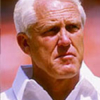Bill Walsh

Bill Walsh
William Ernest Walshwas the head coach of the San Francisco 49ers and the Stanford Cardinal football team, during which time he popularized the West Coast offense. After retiring from the 49ers, Walsh worked as a sports broadcaster for several years and then returned as head coach at Stanford for three seasons...
NationalityAmerican
ProfessionCoach
Date of Birth30 November 1931
CityLos Angeles, CA
CountryUnited States of America
To a winner, complacency and overconfidence can be destructive. To losers, desperation and despondency are just as harmful.
One of the common traits of outstanding performers-coaches, athletes, managers, sales representatives, executives, and others who face a daily up/down, win/lose accounting system-is that a rejection, that is, defeat, is quickly forgotten, replaced eagerly by pursuit of a new order, client, or opponent.
If your why is strong enough you will figure out how!
If you see players who hate practice, their coach isn't doing a very good job.
Your enthusiasm becomes their enthusiasm; your lukewarm presentation becomes their lukewarm interest in what you're offering.
The minute you step away from the negative people in your life you will instantly see the beauty in your horizon.
There is another side [to ego] that can wreck a team or an organization. That is being distracted by your own importance. It can come from your insecurity in working with others. It can be the need to draw attention to yourself in the public arena. It can be a feeling that others are a threat to your own territory. These are all negative manifestations of ego, and if you are not alert to them, you get diverted and your work becomes diffused. Ego in these cases makes people insensitive to how they work with others and it ends up interfering with the real goal of any group efforts.
Failure is part of success, an integral part. Everybody gets knocked down. Knowing it will happen and what you must do when it does is the first step back.
Strength of will - is essential to your survival and success. The competitor who won't go away, who won't stay down, has one of the most formidable competitive advantages of all. In evaluating people, I prize ego. It often translates into a fierce desire to do their best and an inner confidence that stands them in good stead when things really get rough. Psychologists suggest that there is a strong link between ego and competitiveness. All the great performers I've ever coached had ego to spare.
Many people erroneously think they have only one chance to succeed, and if they miss that chance, they are doomed to failure. In fact, most people have several opportunities to succeed.
Afford each person the same respect, support, and fair treatment you would expect if your roles were reversed. Deal with people individually, not as objects who are part of a herd-that's the critical factor.
Invest in great relationships, they will pay a lifetime of dividends.
Your path and purpose will become crystal clear when you begin to trust your vision.
For me the starting point for everything - before strategy, tactics, theories, managing, organizing, philosophy, methodology, talent, or experience - is work ethic. Without one of significant magnitude, you're dead in the water.